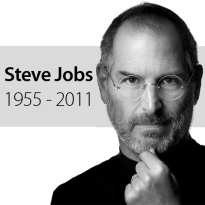 Apple icon Steve Jobs has died at the age of 56 following a lengthy battle with pancreatic cancer. Jobs, who co-founded Apple Computers in 1976, stepped down from his day-to-day role as Apple CEO in August after his health reportedly took a turn for the worse. On Wednesday afternoon, the Apple website posted the following message:
Apple icon Steve Jobs has died at the age of 56 following a lengthy battle with pancreatic cancer. Jobs, who co-founded Apple Computers in 1976, stepped down from his day-to-day role as Apple CEO in August after his health reportedly took a turn for the worse. On Wednesday afternoon, the Apple website posted the following message:
Apple has lost a visionary and creative genius, and the world has lost an amazing human being. Those of us who have been fortunate enough to know and work with Steve have lost a dear friend and an inspiring mentor. Steve leaves behind a company that only he could have built, and his spirit will forever be the foundation of Apple.
With the 1984 introduction of the Macintosh, Apple was widely credited with popularizing the graphical user interface (technically, Xerox beat them to it), which opened up the computer world to people confounded by the arcane text-based interfaces of IBM-compatible machines. But despite its innovations, the Mac remained a niche product, and Jobs was effectively ousted from the company in the mid-1980s. Jobs went on to launch a new line of computers under the NeXT brand, but again, despite being technologically ahead of the curve, the product failed to catch on with the public.
Undaunted, Jobs found success in the film world, purchasing the digital graphics division of George Lucas’ LucasFilm Ltd., which led to the founding of Pixar Animation Studios. The company immediately made its mark with the smash hit Toy Story, followed by a string of enormously successful films known for their cutting edge graphics.
Jobs rejoined Apple in the mid-90s, at a point when the company was flirting with bankruptcy. After convincing Apple to purchase his NeXT technology for $400m, Jobs’ first new product line was the wildly successful multi-colored plexiglass iMac, and Jobs used the momentum to expand Apple’s reach into other technologies. While the music industry was desperately trying to reinvent itself in an MP3 world, Jobs seized the initiative with his combination of the iPod portable music devices and the iTunes store. The iPhone and iPad soon followed, setting a pace for smartphone and tablet development that competitors are still trying to match.
Technology aside, Jobs was also a keen brand manager. Apple’s marketing was almost as influential as its sleek, streamlined product design. While other companies overstuffed their me-too products with extra features and controls, Jobs insisted that the technology never get in the consumer’s way. Apple’s gear looked cool and it worked out of the box with the lowest possible learning curve. The results spoke for themselves. In 15 years, Jobs lifted Apple from near-bankruptcy to become the second most valuable company in the world.
A Buddhist, Jobs once told a Stanford University graduating class that “No one wants to die. And yet death is the destination we all share. No one has ever escaped it.” Jobs may not have been able to escape death, but his name will endure as one of history’s foremost business titans and a true creative visionary. And on a personal note, as a DOS-hating technophobe who bought his first Mac Plus (the ‘Plus’ stood for the whopping 1 megabyte of RAM) in 1988, I don’t know what I would have done without him. So Steve… iThank you.
With Jobs’ passing, all eyes will turn to Tim Cook, who assumed the CEO role following Jobs’ departure. He’s already had a rough introduction, with Tuesday’s iPhone 4S announcement disappointing both fanboys and market analysts who were anticipating an iPhone 5 release. Personally, Cook’s in a no-win situation. There’s no replacing Steve Jobs. The real question on everyone’s mind is whether Jobs’ relentless drive to produce “insanely great” Apple products will survive his passing.





